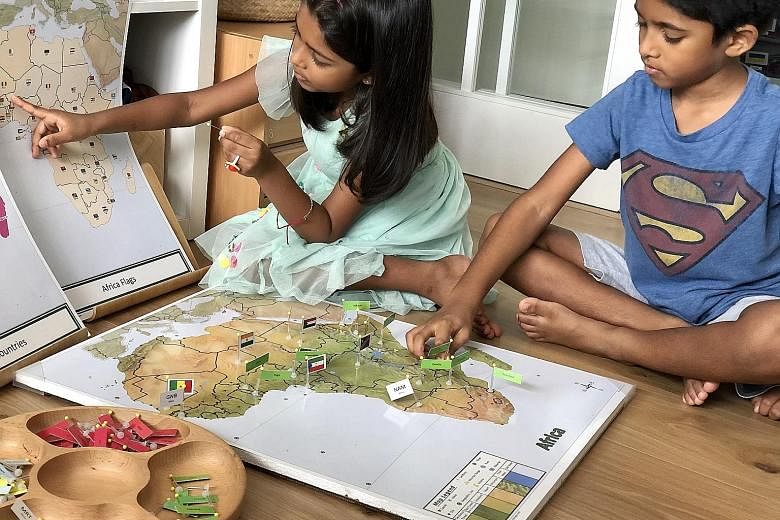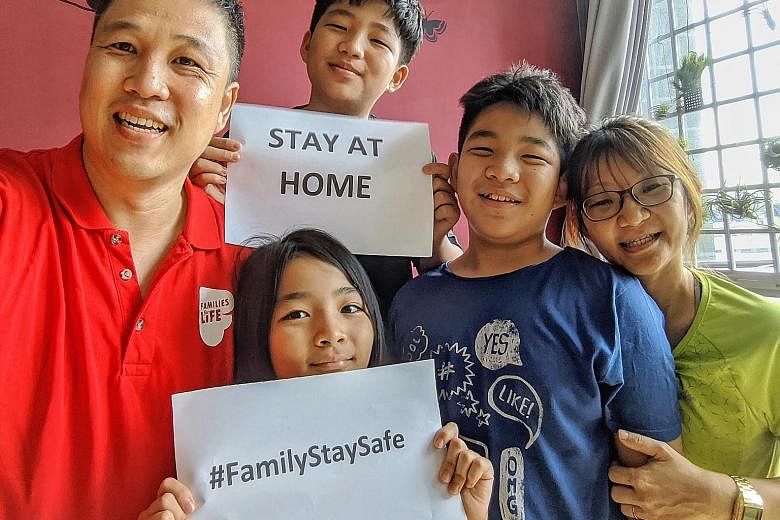Over the past 31/2 weeks of learning and working from home under the circuit breaker measures, families in Singapore have settled into a routine.
Come Tuesday, though, parents will face a 28-day school holiday with their active youngsters - with nowhere to go.
The first thing to do, advises father of three Kelvin Ang, 43, is to draw up and keep to a schedule during the holidays. "Because parents will be tearing their hair out if their kids keep asking what they are going to be doing every 15 minutes," he says.
It pays to involve children in drawing up a broad daily routine that covers playing, exercising, reading and chores, as well as revision for school-going kids, suggests the financial planner, whose longstanding Cheekiemonkies blog is popular with parents looking for kid-friendly activities.
Empower them to make small decisions, from what board game to play to which movie to watch to planning the dinner menu.
"I find that by having such a schedule mapped out for the week, the kids tend to gravitate to the parents less because they already have something to look forward to," adds Mr Ang, who has two sons aged 15 and 13 and a nine-year-old daughter.
He plans to carve out time every day from work to bond with his children over board and card games, video games and baking.
Mrs Aparna Chari Sundar, 34, is looking forward to the "much-needed downtime" with her two children, who are in Primary 2 and Kindergarten 2.
The National Geographic certified educator, who blogs at Global Mindful Journey, plans to explore new countries with her kids using learning activities. These easily occupy them for a few hours every day, she says.
In addition, her kids play with open-ended toys such as Lego, Magnatiles and wooden blocks, as well as recyclable and art materials. As she aims to keep screen time to a minimum, she is turning to audio stories for children, such as Around The World Stories and Audible.
"My mother used to tell me while growing up that there's no such word as 'bored', so I have consciously never used that word with my kids," says the former hospital administrator and trained doctor.
"When we provide an environment that meets their needs in a minimalist manner, it allows for self-expression and is less overwhelming. Kids can definitely occupy themselves on their own without us asking them if they're bored. We just have to trust them."
It is also important to keep youngsters physically active, even while being confined at home.
Associate Professor May Lim, director of the Centre for Learning Environment and Assessment Development at the Singapore Institute of Technology, says: "Children need to move. Without movement, they can appear increasingly restless and throw tantrums."
Besides kid-friendly exercise and dance videos, activities such as homemade obstacle courses and simple housework count too, she adds.
Unfortunately, Prof Lim notes that the circuit breaker period has worn down the defences of many working parents. Unused to being with their children all day atop balancing work commitments, many have resorted to giving in to their children's requests just to avoid them whining or having meltdowns.
"A parent who was consulting me over tele-rehabilitation told me she did not want her child to cry and make noise while she was in an online meeting with her bosses, so she decided to give in," she says.
"Over an extended period, children can establish new unhealthy habits or behaviour as a result," she warns. These include screen time without limits, unhealthy snacking, sleeping and waking up late, insisting on being fed instead of feeding themselves, and snatching toys without being punished.
She recommends being consistent in managing your child's behaviour and setting goals for kids, such as eating only two pieces of chocolate a day or going to bed by 9.30pm. When they achieve the targets over, say, a week, "provide positive reinforcement".
When children act up, they are actually communicating with their parents, says Ms Jacinth Liew, 34, a former secondary school teacher who runs positive parenting workshops and offers parenting resources on her website, Our Little Playnest.
"They constantly seek connection from us, not by telling us 'I am bored' or 'I am anxious', but by displaying negative behaviour like screaming, getting violent with siblings and throwing tantrums," says the mother of two kids aged four and six.
While many parents focus just on stopping undesirable behaviour, this approach does not address the underlying issues. Instead, they should "connect before you correct" by acknowledging their children's feelings, keeping them close and calming them down - all of which, she admits, requires patience and intention.
Parents should always connect and play with their children before starting their own work or chores.
"When you can speak their love languages - such as quality time or physical touch - and fill up their emotional tanks before you get busy, children are more ready to play independently and less likely to disturb you while you cook or reply to e-mails," she adds.
In addition, parents with toddlers and pre-schoolers can take advantage of the month-long break to work on behaviour management and self-care goals that require consistency, like toilet training, eating meals independently and sleeping in their own rooms, Prof Lim suggests.
"Behaviour can take a few weeks to change and can get worse before improvement," she says, adding that parents often complain that habits are hard to change when a child routinely shuttles between home and childcare or a caregiver.
"By establishing consistency between the parents and sticking to the new routines over the next few weeks, there is a good chance these routines and developments can be successfully cemented."
On stressful days, working parents should give themselves permission to "take leave" and just enjoy time with their kids, says Prof Lim.
She has planned month-long projects for her children, including encouraging her 10-year-old daughter to create a novel by writing a page each day and her seven-year-old son to compile a book of mazes or word-search activities in the same way.
On what works for her, she says: "When I am really overwhelmed, I stop what I am doing and just spend a good 10 minutes with my kids, hug them, connect with them and have a good laugh. Once they feel they have had enough of me, they leave me to go back to my work."
Parenting coach Ms Liew reminds mums and dads to see the silver lining in the school break - the chance to strengthen the bond between parent and child, and between siblings.
"Previously, working parents often rushed to get meals prepared, nagged at their children to clean up and get to bed early and so on," she says.
Now, family time slows down, meals can be made together and there is time for conversation, games and books.
"Especially for fathers who don't get to hang out with their children often, this is a good time to strengthen the father-child relationship," she says.
"My children are excited to have dinner with their father because they don't usually see him until bedtime every night."
Correction note: The article has been edited to show the correct name of Mr Kelvin Ang's wife in the caption. We are sorry for the error.














